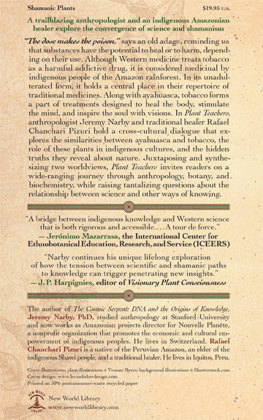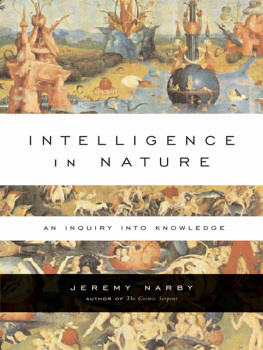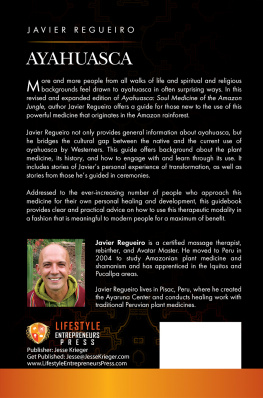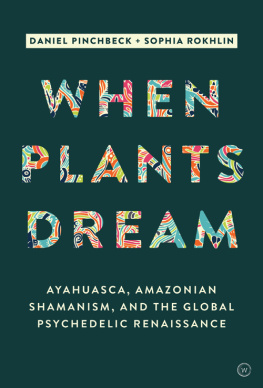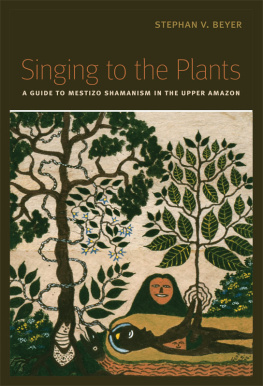Contents
Guide
Pages
Praise for Plant Teachers
A wonderful book, comprehensive and concise, bridging cultures at a time when we need it the most. Jeremy Narby, this time with the help of Rafael Chanchari Pizuri, invites science back to the dance to learn, laugh, and remember.
J OSEPH T AFUR , MD, author of The Fellowship of the River: A Medical Doctors Exploration into Traditional Amazonian Plant Medicine
Plant Teachers offers a rare glimpse into the worldview of a Peruvian healer, Rafael Chanchari Pizuri. Anthropologist Jeremy Narby is our guide, bridging Western science with traditional knowledge, traversing this gap delicately and respectfully. The first chapter describes the indigenous belief that certain plant species have an owner or mother something like a personality and that it is possible to learn from that other-than-human source. This book presents an opportunity for Westerners to stretch their concept of reality and enter into the magical depths of the Amazonian jungle, a wholly different kind of learning.
R ACHEL H ARRIS , author of Listening to Ayahuasca: New Hope for Depression, Addiction, PTSD, and Anxiety
Tobacco is the preeminent medicine plant of the Americas, yet few anthropologists have ever paid attention to it. This book may be the first to take a serious and respectful look at the spiritual role of tobacco in an indigenous culture. Half of the book is about ayahuasca, and it makes a valuable contribution to ayahuasca literature, offering insights from the Shawi culture and a discussion of ayahuasca pharmacology that is one of the most thorough, up-to-date, and readable I have seen. But what makes this book stand out indeed, what make it unique is its treatment of the subject of tobacco. By juxtaposing ayahuasca and tobacco as plant teachers, this book conveys that tobacco is to be taken as seriously as ayahuasca. Plant Teachers may open the door to a new way of looking at tobacco.
G AYLE H IGHPINE , linguist and author of Unraveling the Mystery of the Origin of Ayahuasca
Jeremy Narbys interest in validating indigenous knowledge in the light of science is long-standing. Here, he juxtaposes interviews, evidence-based debunking of misconceptions about tobacco, and reconsidering of assumptions on DMT-enhanced ayahuasca to bring forth productive insights. Rafael Chanchari Pizuris views are informed by both his ancestral tradition and his acquaintance with biomedicine: he is clearly a cross-cultural knowledge seeker. Socratic exchanges on local understandings of ecology in an animist worldview open a small but irresistible window into the complexity of Amazonian shamanic plant knowledge. Are the hornworms, who prey on tobacco plants, pests or valued spirit owners or both? Not merely a reductionist match between science and a Shawi shamans perceptions, this reference-packed little book leads the reader to a refreshing, open-ended questioning. By intertwining his and Chancharis pursuits of knowledge in dialogue, Jeremy Narby successfully de-exoticizes both Amazonian shamanic and possible global therapeutic uses of tobacco and ayahuasca, bringing them closer together.
F RANOISE B ARBIRA F REEDMAN , affiliated lecturer in the department of social anthropology, University of Cambridge
Jeremy Narby likes to pry into lifes mysteries, and in Plant Teachers he and coauthor Rafael Chanchari Pizuri carry on that noble pursuit with excellence. Taking on the challenging topic of tobacco as sacred medicine, they manage to make sense of it all in a manner exceeding what others have tried. Much of the book is a conversation between the authors. Rafael, a Shawi indigenous man and mdico from Peru, offers experienced advice and unique insights into the discussion of the plants and their uses. He is wonderfully down-to-earth and straightforward. The long elucidation of ayahuasca is very finely done, and the book packs in a huge number of references. This is a fine piece of work. Bravo!
C HRIS K ILHAM , medicine hunter
Once again the brilliant advocate of bi-cognitive consciousness, with his usual crystalline clarity and scalpel-sharp precision, Jeremy Narby continues his unique lifelong exploration of how the tension between scientific and shamanic paths to knowledge can trigger penetrating new insights. In dialogue with his deeply informed, profoundly sophisticated interlocutor, Shawi healer Rafael Chanchari Pizuri, Jeremy dives into rarely discussed aspects of traditional Amazonian plant usage and the most updated scientific research on the topic, offering a much-needed corrective in a field recently deluged with far too many half-baked, overly romanticized takes on shamanism.
J. P. H ARPIGNIES , author of Delusions of Normality and Animal Encounters and editor of Visionary Plant Consciousness
Jeremy Narby has done it again. This is just the book that is needed in these times: a bridge between indigenous knowledge and Western science that is both rigorous and accessible. Narby has deep respect from both ways of knowing and masterfully reconciles them together into a holistic perspective that is bigger than the sum of its parts. A tour de force for anyone interested in the world of plant teachers, ayahuasca, or tobacco.
J ERNIMO M AZARRASA , the International Center for Ethnobotanical Education, Research, and Service (ICEERS)



| New World Library 14 Pamaron Way Novato, California 94949 |
Copyright 2021 by Jeremy Narby and Rafael Chanchari Pizuri
All rights reserved. This book may not be reproduced in whole or in part, stored in a retrieval system, or transmitted in any form or by any means electronic, mechanical, or other without written permission from the publisher, except by a reviewer, who may quote brief passages in a review.
The material in this book is intended for education. It is not meant to take the place of diagnosis and treatment by a qualified medical practitioner or therapist and does not represent advocacy for illegal activities. Any application of the material set forth in the following pages is at the readers sole discretion and risk, and the author and publisher assume no responsibility for any actions taken either now or in the future. No expressed or implied guarantee of the effects of the use of the recommendations can be given or liability taken.
Text design by Tracy Cunningham and Tona Pearce Myers
Illustrations on pages
Library of Congress Cataloging-in-Publication Data
Names: Narby, Jeremy, author. | Pizuri, Rafael Chanchari, author.
Title: Plant teachers : ayahuasca, tobacco, and the pursuit of knowledge / Jeremy Narby, with Rafael Chanchari Pizuri.
Other titles: Ayahuasca, tobacco, and the pursuit of knowledge.
Description: Novato, California : New World Library, [2021] | Includes bibliographical references and index. | Summary: A western anthropologist and an indigenous Peruvian shaman hold a cross-cultural dialogue about the similarities between tobacco and the hallucinogen ayahuasca and the role these substances both play in the cultures of the indigenous peoples of the Amazon region-- Provided by publisher.

